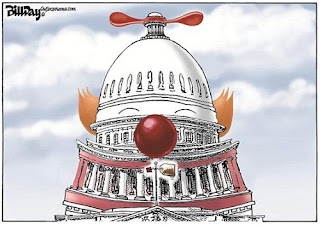When I was a teenager back in the 1960's, my favorite musical group was Gary Lewis and the Playboys, and my favorite of their songs was "Everybody Loves a Clown." In my senior year of high school, I was awarded the class prize for "Best Sense of Humor" (a plastic outhouse with a figure inside that, when the door was opened, turned around and sprayed you). I grew up with Emmett Kelly and his beloved clown Weary Willie ...
Today, though, clowns are not very well received.
Clowns are no longer figures of joy and innocent happiness, but of sinister threat. Many characters in popular media are noted for their aversion to clowns - for instance, FBI agent Seely Booth in the TV series Bones and otherwise fearless former Navy Seal-turned-NCIS-agent Sam Hanna in the series NCIS: Los Angeles. In the real world, police around the country are fielding calls about dangerous, knife-wielding clowns threatening children and attacking women. The murderous clown Pennywise was a central figure in Stephen King's novel It ...
What's going on? When did jolly, happy clowns become evil figures?
Scholarly papers have been written and serious studies performed to answer the question. In March of this year, Francis T. McAndrew and Sara S. Koehnke published a paper titled "On the nature of creepiness" that didn't specifically address the clown issue, but which provided some insights into why clowns can be perceived as evil or threatening. There were four key takeaway in the paper:
People perceived as creepy are more likely to be male than female. Most clown figures are male - check.
Females are more likely than males to perceive sexual threat from a creepy person. This makes sense, in that females have more at stake in a sexual encounter. Would a clown be perceived as sexually creepier than, say, a politician?
Unpredictability is an important component of creepiness. Clowns derive much of their entertainment value from being unpredictable. Most of the time, this unpredictability is innocuous or funny, as when he does a pratfall or reacts in a funny way to some object or action. A clown's unpredictability is less funny when it is expressed in a way perceived as threatening ... such as a Donald Trump meltdown.
and,
Some occupations and hobbies are more strongly linked with creepiness than others. Some occupations are perceived as being inherently "strange" or "threatening." For instance, funeral directors, taxidermists, clowns - and clergy - all scored high "creepiness quotients." Politicians, interestingly enough, did not appear on the list.
Perhaps it's because of ...
But no matter how the election turns out, there's no need to send in the clowns, for as Judi Collins reminds us musically ...
Clowns: funny or frightening, or context dependent? Leave a comment and let me know what you think.
Have a good day. More thoughts tomorrow.
Bilbo






6 comments:
I don't like clowns because they come across as creepy and unpredictable. Why send in the clowns? They're around in everyday life.
I have seen clowns in the guise of college administrators.
I find them creepy as all get out. From Ronald McDonald to Congress..the clowns are all scary
Isn't it rich...
Clarabell the clown on Howdy Doody.
I'm creeped out enough by the Governor of Alabama and Judge Roy Moore.
Post a Comment